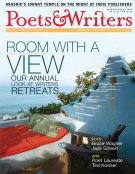After winning the Tanning Prize—now called the Wallace Stevens Award—from the Academy of American Poets in April 1996, James Tate gave a public reading in New York City. After reading a few poems, Tate stopped abruptly and said, “Well, we’ve survived [National] Poetry Month. It was a very close call for some of us. Thank God.”
Paul Yamazaki, a buyer for City Lights Books, says in the first years of NPM, poetry sales at the store increased by nearly 18 percent.
Nine years after Tate got belly laughs from his audience, the Academy is preparing to celebrate the 10th annual National Poetry Month in April. NPM is still going strong, and still eliciting strong reactions from the poetry community. It is seen, depending on one’s perspective, as either a marketing bonanza or a wonderful excuse to bring poems into the public sphere.
“It’s done what it set out to do, which is to seriously raise the profile of poetry,” says Tree Swenson, the Academy’s executive director. “National Poetry Month is one of the components that has raised the water level of poetry.”
The Academy is planning its typical water-level-raising events for this year’s celebration. Book designer Chip Kidd designed a promotional poster, 175,000 copies of which will be given to libraries, schools, and bookstores nationwide. Scores of publishers, labeled NPM sponsors, will schedule special events and new poetry titles for April. And a third installment of the celebrity-studded “Poetry and the Creative Mind” fund-raiser, to be held April 5 at Lincoln Center’s 1,100-seat Alice Tully Hall, will feature actress Meryl Streep, architect Maya Lin, playwright Suzan-Lori Parks, and network anchorman Dan Rather, all reading their favorite poems.
This year’s celebration will also include two new programs. The first is “Ten Years/Ten Cities,” which will feature well-known poets reading at venues across the country, from Maxine Kumin in Seattle to Jorie Graham in Washington, D.C., all sponsored by the Academy or cosponsored with local poetry organizations. The second is an effort to start poetry reading groups. The Academy will resuscitate its Poetry Book Club—launched in July 1998 but defunct since October 2002—this time with a retail partner. The Academy’s Web site (poets.org) will offer book recommendations for reading groups, as well as free Readers Guides of notable poetry books each month. A guide for Walt Whitman’s Leaves of Grass will be the first.
Charles Flowers, the associate director of the Academy, says the reading group initiative is part of an effort to uphold the larger principle of the organization’s dedication to poetry book publishing. It’s also in response to the NEA Reading at Risk survey, issued in June 2004, which reports the percentage of adults reading literature has decreased 10 percent in the past 20 years (from 56.9 percent to 46.7 percent). “It’s hard to measure how much is read or written during National Poetry Month,” Flowers says. With the reading groups and the book club, the Academy will “try to quantify who’s reading and buying poetry on a regular basis.”
Paul Yamazaki, a buyer for City Lights Books, says in the first years of NPM, poetry sales at the store increased by nearly 18 percent. “It’s a very strong stimulus for independent booksellers and publishers of poetry,” he says. Independent literary presses—Yamazaki cites Copper Canyon, Coffee House, Graywolf, Kelsey Street, O Books, and Sarabande, among others—“have found many new readers who look for their colophons on the shelves of City Lights Books.”
Laura Moriarty, the deputy director of Small Press Distribution in Berkeley, California, points to the “small bump” in March sales as bookstores plan for April readings. NPM, she says, is a “fine opportunity” to reach outside the admittedly small circles of regular poetry buyers.
NPM, though, has its share of critics. In his keynote address at the 1996 PEN Literary Awards ceremony, past Academy chancellor Richard Howard said that NPM is “the worst thing to have happened to poetry since the advent of the camera and the internal combustion engine.” In his essay “Against National Poetry Month As Such,” which he read on National Public Radio, poet Charles Bernstein complains that NPM “tend[s] to focus on the most conventional of contemporary poetry” and suggests an alternative title of National Mainstream Poetry Month.
“We take it all in stride,” says Flowers of the criticism. “The fact that people are talking about it is a good thing.”
The consensus seems to be that the annual poetry celebrations aren’t hurting anyone and may even turn a reader or two to a book of poems, which is generally regarded as a step in the right direction. “I’m certain that anything that brings poetry to a wider audience is a good thing,” Pulitzer Prize–winning poet Paul Muldoon says. “At the end of the day, poetry needs to be seen as an ordinary part of our lives rather than something extraordinary.”








